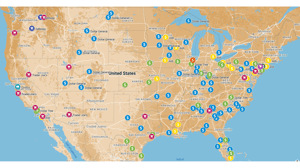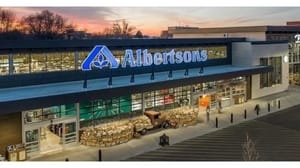SCREENING EMPLOYEES
Computer-based training in supermarkets is on the move, marching past the front end into other key areas of operation.Spurred by success with cashier training, retailers are eager to use computers to better educate all store staff in a wide range of areas including deli operations, safety practices and sexual harassment policies."We're not stopping with the front end," said John Cox, CBT specialist
November 25, 1996
DON YAEGER
Computer-based training in supermarkets is on the move, marching past the front end into other key areas of operation.
Spurred by success with cashier training, retailers are eager to use computers to better educate all store staff in a wide range of areas including deli operations, safety practices and sexual harassment policies.
"We're not stopping with the front end," said John Cox, CBT specialist at Price Chopper Supermarkets, Schenectady, N.Y. "We have a lot of things in the works."
For starters, the chain was to deploy new training modules, based on CD-ROM technology, for safety training of all associates earlier this month.
The program incorporates Occupational Safety and Hazard Administration guidelines in fire safety, electrical equipment operations and employee's right-to-know information regarding hazardous materials.
Price Chopper is not alone in expanding the scope of computer based training. Others looking to leverage the tool include Finast, Maple Heights, Ohio; Fleming Cos., Oklahoma City; Big V Supermarkets, Florida, N.Y., and a growing number of independent retailers.
The benefits of computer-based training, already evident in front-end programs, will be well-received in other areas of the store while speeding the overall return on investment in hardware and software, retailers said. Among the chief advantages computer training delivers over conventional instruction are:
Improved employee retention. Reduced turnover is money saved, say retailers, many of whom have reported dramatic improvements in this area.
Big V, for one, saw front-end staff turnover plummet by 60% after computer-based training was in place 30 days, said Tony Scibelli, manager, training and development.
Reduced training time. Retailers said new hires absorb information more quickly than through conventional training, although the importance of classroom time cannot be underestimated.
At Price Chopper, which rolled out the programs to 91 stores this year, cashier training time was reduced 40%, and trainer time was cut 75%, according to Cox. He said conventional training methods should not be abandoned altogether, however.
"Computer-based training still must be done with a certain degree of classroom time," he said. Price Chopper combines eight to 10 hours of computer training with equal time spent in the classroom and on-the-job training for cashiers.
Consistent instruction content. Because all staff receive the same information in the same manner, retailers are assured of minimal variance in training quality levels.
"In the past, if a couple of trainers had a bad day or had someone out sick, it may have been reflected in their work," said Louis Frame, director of human resources at the 23-store Niemann Foods, Quincy, Ill.
"We're also having less turnover because being trained better, there are fewer frustrations," he said. For example, during a 24-day test period, cashiers trained on computer averaged cash over-and-short errors of $287 compared with traditionally trained staff, whose average error was $651.
Fleming's Adams agreed that computer training heightens job knowledge, confidence and morale. "The person is under less stress and is happier with the job," he said.
Turnover among cashiers at Niemann dropped 12% when CBT was tested earlier this year in four stores in the Champaign-Urbana, Ill., market. Those favorable results have prompted the chain to expand the program to three more stores in Quincy and two units in Springfield, Ill.
Dean Knutson, senior instructor at Supervalu University, which is run by the Minneapolis wholesaler, said interest in computer training among independents is growing but cost issues remain a key obstacle.
"With the results that CBT has had in improving training quality, it is unfortunate that they are not taking a more serious look," said Knutson.
Fleming's Paul Adams, director of retail education services, agreed smaller retailers are slower to adopt the technology. As cost comes down, he said, interest will rise. Currently, 15 of Fleming's affiliated retailers are actively pursuing or testing the technology.
For some retailers, the added expense of advanced technology can be justified. Big V uses touch-screen monitors, which add about $800 to the cost of the hardware, because they can be used by staff with no computer skills whatsoever.
Even more compelling than the technology that drives CBT is the degree to which it can be deployed across an organization.
At Finast, a training module covering store orientation is in the discussion stage, said Eelco Kleefstra, project manager. Geared to all new employees, the training would cover company philosophy, history, benefits of working for Finast, news of the various store departments, customer-service policies and even the background of sister companies under the same corporate umbrella.
A 20-minute module on Finast's frequent shopper card program has been added to cashier training. Trainees learn the importance of asking all customers for their cards, the types of program savings offered and the workings of clipless coupons.
Finast plans to deploy computers for deli training next. Software now under development will focus initially on slicer safety and sanitation, Kleefstra said. Trainees, using a mouse and keyboard, will also learn proper case layout, by clicking on and moving products into correct slots.
Price Chopper's deli program, which is expected to be ready by early next year, will include some role-playing in which the trainee must respond to spontaneous customer crises or complaints.
Niemann's Frame said the company will test a deli program soon and is taking a look at training in OSHA guidelines.
Fleming is evaluating a computerized management-development module which would educate department heads and entry-level and veteran managers about a variety of current topics including sexual harassment, according to Adams.
Big V's Scibelli heralded the value of computer-based training, but cautioned against over-automating the process.
"Store managers can get too reliant on the training systems," he noted. "They say, 'You've spent 12 hours on the computer and you're ready to go' but you can't totally rely on that. You must give them some hands-on work before putting them on their own."
About the Author
You May Also Like




